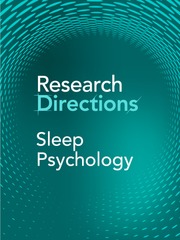Sleep and circadian disruptions are inevitable in life, affecting physical, cognitive, and emotional functioning. However, the impact of these disturbances is not universal. There are marked interindividual differences in vulnerability, with some people showing significant impairments while others remain relatively unaffected. Research has traditionally focused on vulnerability to sleep loss, highlighting those most prone to impairment. This Question paper shifts the focus to sleep resilience, the ability to maintain function despite unavoidable sleep and circadian disruptions. This topic also includes efforts to use sleep to promote general resilience. Sleep resilience is a key construct with important implications for performance in work, school, and sports. Understanding the biopsychosocial factors that promote resilience is essential for identifying protective mechanisms. This paper invites submissions aimed at exploring these factors and developing strategies to enhance sleep resilience and use sleep to promote general resilience.
Context
Sleep is essential to life (de Manacéïne Reference de Manacéïne1894). Sleep health refers to a consistent pattern of obtaining sleep quality and quantity tailored to individual needs and shaped by the demands of one’s cultural context (Buysse Reference Buysse2014). Along with nutrition and exercise, sleep health is widely recognized as a pillar of health. However, sleep and circadian disruptions are inevitable for most individuals due to innumerable unavoidable causes such as travel, stress, childcare, emergencies, and environmental influences. As the pioneering sleep psychologist Dr. Bernie Webb aptly described, “Sleep is an instrument easily put out of tune” (Webb Reference Webb1992).
The adverse outcomes of sleep and circadian disruption are well-documented and include cognitive, affective, behavioral, and physical impairments. While many people experience some level of sleep-related impairment, individual differences in the performance domain affected and severity of vulnerability are striking. Some individuals show extreme deficits after sleep loss, while others appear resilient, even in the face of severe deprivation (Rocklage et al. Reference Rocklage, Williams, Pacheco and Schnyer2009; Van Dongen et al. Reference Van Dongen, Maislin, Mullington and Dinges2003). Traditionally, these differences have been framed within a vulnerability perspective, focusing on factors like age, genetics, brain structure or function, disease, and baseline cognitive status as contributors to sleep vulnerability (Drummond et al. Reference Drummond, Brown, Stricker, Buxton, Wong and Gillin1999; Van Dongen et al. Reference Van Dongen, Baynard, Maislin and Dinges2004).
This question paper shifts the focus toward resilience – a health-promotion framework that acknowledges not only vulnerabilities but also strengths. Resilience is the ability to adapt, thrive, and maintain function despite adversity, emerging from challenging experiences rather than being an inherent trait (Luthar and Cicchetti Reference Luthar and Cicchetti2000; Southwick et al. Reference Southwick, Bonanno, Masten, Panter-Brick and Yehuda2014). There is increasing interest in harnessing sleep to promote general resilience (Arora et al. Reference Arora, Grey, Östlundh, Alamoodi, Omar, Hubert Lam and Grandner2022; Guida et al. Reference Guida, Alfini, Lee, Miller, Riscuta, Rusch, Wali and Dixit2023; Wu et al. Reference Wu, Ding, Ai, Zhang and Cai2024; Yang et al. Reference Yang, Huang, Tang, Xu, Lin, Wang, Chen, Wang, Gao and Xiao2024). Sleep resilience refers specifically to the capacity to function emotionally, cognitively, and physically despite sleep or circadian disturbances. Given the inevitability of sleep and circadian disruptions, cultivating sleep resilience offers a promising avenue for improving overall health and functioning. In a broader sense, sleep resilience research is also interested in determining how sleep and circadian science can be harnessed to promote greater general resilience.
We invite papers that offer insights into:
-
How to measure sleep resilience across units of analysis
-
Biopsychosocial determinants of sleep resilience
-
How sleep promotes molecular, physiological, and psychological resilience
-
Associations between sleep resilience and other dimensions of sleep health
-
Associations between sleep resilience and other psychological constructs
-
Associations between sleep, sleep resilience, and general resilience
-
The role of compensatory strategies in sleep resilience
-
The vulnerability hypothesis in relation to sleep and resilience
-
The role of sleep resilience in development of sleep disorders
-
Evolutionary basis of individual differences in sleep resilience
-
Intervention studies that target sleep resilience
How to contribute to this Question
If you believe you can contribute to answering this Question with your research outputs, find out how to submit in the Instructions for authors. This journal publishes Preregistered Reports, Results and Methods, Analyses, and Impact papers. Additional content such as preprints, posters, oral presentation slides, and other forms of “grey literature” can be submitted to the Community. Questions will be closed when the editors agree that enough has been published to answer the Question so before submitting, check if this is still an active Question. If it is closed, another relevant Question may be currently open, so do review all the open Questions in your field. For any further queries check the information pages or contact this email [email protected].
Competing interests
The authors declare no competing interests.





